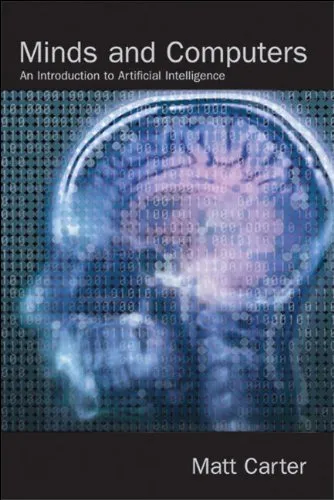Minds and Computers: The Philosophy of Artificial Intelligence
3.5
Reviews from our users

You Can Ask your questions from this book's AI after Login
Each download or ask from book AI costs 2 points. To earn more free points, please visit the Points Guide Page and complete some valuable actions.Related Refrences:
Welcome to the fascinating journey through the intersection of human cognition and artificial intelligence, as explored in 'Minds and Computers: The Philosophy of Artificial Intelligence.' This book delves into the philosophical questions that arise when machines emulate human thought and the implications this has for our understanding of the mind.
Detailed Summary
'Minds and Computers' offers a comprehensive overview of the philosophical issues surrounding artificial intelligence (AI). The book tackles foundational questions such as: "Can machines think?" and "What is the mind?" It critically examines the roots of these questions, drawing from philosophy, cognitive science, and computer science.
The narrative begins with the historical context of AI, discussing the evolution of the field from its inception to modern advancements. The book captures the thoughts of renowned philosophers and scientists, analyzing theories like the Turing Test, the Chinese Room Argument, and the philosophy of mind. Through these discussions, it provides readers with a framework to understand how AI reflects our own cognitive processes.
By addressing both the potential and the limitations of AI, this work encourages readers to ponder the moral and ethical dimensions of artificial intelligence. What does it mean for machines to possess intelligence? How do we determine the boundaries of machine consciousness? 'Minds and Computers' invites readers to explore these intriguing questions with scholarly depth.
Key Takeaways
- The relationship between human intelligence and machine intelligence is more complex than it appears on the surface.
- AI challenges our traditional notions of cognition, necessitating a re-evaluation of what constitutes a 'mind'.
- Philosophical tools can help us grapple with ethical dilemmas posed by AI advancements.
- Understanding AI's capabilities requires an interdisciplinary approach, blending insights from computer science, philosophy, and psychology.
Famous Quotes From the Book
“The question is not whether machines can think, but what we can learn about ourselves from machines that appear to think.”
“Philosophy and AI are entwined in a dance, revealing and concealing the mysteries of cognition.”
Why This Book Matters
'Minds and Computers' stands out due to its multidisciplinary approach to exploring AI. It is not just a technical examination but a philosophical inquiry into the very nature of intelligence and consciousness. This makes it an essential read for those interested in understanding the moral, ethical, and existential questions tied to AI's ascent.
In a world where AI technologies are rapidly advancing, the importance of questioning the implications of creating machines that might one day reflect human-like cognition cannot be understated. 'Minds and Computers' offers a rich, thought-provoking exploration, encouraging readers to reflect deeply on what it means to create technology in our image and how this impacts our future.
This book is invaluable for students, educators, philosophers, scientists, and anyone dedicated to understanding the full spectrum of challenges and opportunities presented by artificial intelligence. It equips readers with a thorough philosophical foundation to engage with one of the most pressing intellectual challenges of our time.
Free Direct Download
You Can Download this book after Login
Accessing books through legal platforms and public libraries not only supports the rights of authors and publishers but also contributes to the sustainability of reading culture. Before downloading, please take a moment to consider these options.
Find this book on other platforms:
WorldCat helps you find books in libraries worldwide.
See ratings, reviews, and discussions on Goodreads.
Find and buy rare or used books on AbeBooks.
1336
بازدید3.5
امتیاز50
نظر98%
رضایتReviews:
3.5
Based on 0 users review
"کیفیت چاپ عالی بود، خیلی راضیام"
Questions & Answers
Ask questions about this book or help others by answering
No questions yet. Be the first to ask!



